America On Trial
Cruel and Unusual Punishment at |
In
the un-humbled opinion of one, Poetic Justice...
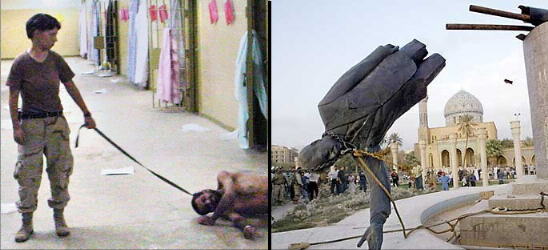
In the war on terror,
the photographing of prisoners held in US-run jails all over the world seems
to be a critical part of a new, American dehumanizing interrogation
process. |
Archbishop Giovanni
Lajolo described
the abuses
as "a tragic episode in the relationship with Islam" and
said the scandal would fuel hatred for the West and for
Christianity. Archbishop Lajolo was also quoted as saying:
"The torture? A more serious
blow to the
United States than September 11 -- except that
the blow was not inflicted by terrorists, but by
Americans against themselves."
What Happened at Abu
Ghraib Prison?
Click to open a larger
picture in a new window.
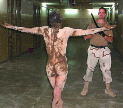 |
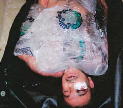 |
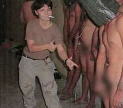 |
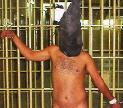 |
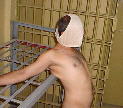 |
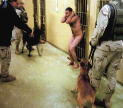 |
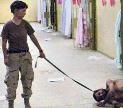 |
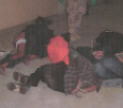 |
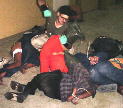 |
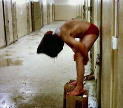 |
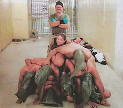 |
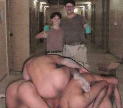 |
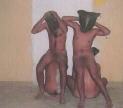 |
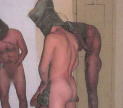 |
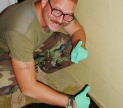 |
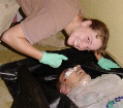 |
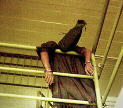 |
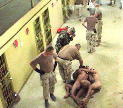 |
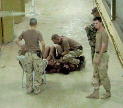 |
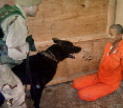 |
![]()
Spec. Joseph M. Darby
|
"Power corrupts the few, while weakness corrupts the many."
-- Eric Hoffer
Just a Few Bad
Apples?
So far only a handful of people
are being blamed. The cases against the soldiers -- there are now seven charged
-- are each quite different.
"We intend to put the military on trial for their breakdown in leadership,
structure, guidance, policy," said lawyer Paul Bergrin.
One defendant, Specialist Megan M. Ambuhl, says she was merely a bystander
who treated the Iraqi detainees kindly, giving them copies of the Koran and
making sure their meals contained no pork. Specialist Ambuhl is charged with
conspiracy and dereliction of duty but has not been implicated in the most
serious abuse.
Specialist Jeremy C. Sivits, in a statement to investigators, described
brutal conduct by Staff Sgt. Ivan L. Frederick II and Specialist
Charles A. Graner Jr., who, in turn, call him a liar. Sivits's lawyer
is Stanley L. Martin.
In return for a lighter sentence--a year in jail, demotion, and expulsion
from the Army -- Spc. Jeremy Sivits promised to testify against the military
police accused of ruthlessly abusing prisoners.
Then there is Sgt. Javal S. Davis. His lawyer, Paul Bergrin, accuses
the government of abusing him by interrogating him for 20 sleepless hours
right after he worked a 60-hour shift at Abu Ghraib.
Specialist Graner and Sergeant Frederick, are charged with the worst conduct,
including placing naked detainees in a human pyramid and photographing them,
ordering them to masturbate, placing them in sexual positions and ordering
them to strike each other. They are also accused of hitting detainees so
hard they required medical attention.
"Our defense says he was following orders and that he believed the orders
were lawful," said Guy L. Womack, a lawyer for Specialist Graner.
"We have been informed that these pictures were being used by military
intelligence and were to be used because these are Muslim men, and the ultimate
humiliation was to be naked in the presence of women," said Rose Mary Zapor
who represents Private England.
"We thought
it looked funny so pictures were taken."
-- Pfc.
Lynndie England, May 5,
2004
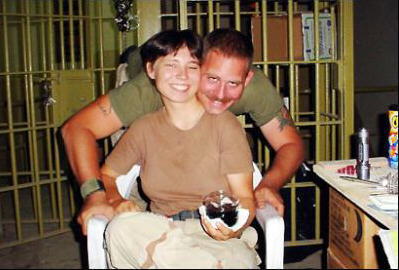
Private England Speaks
(1.5 MOV file)
![]()
At least 37 death investigations
of US detainees are presently underway.
The Army has undertaken criminal
investigations into the deaths of at least 32 Iraqis and five Afghans held
by U.S. forces since August 2002, Pentagon officials revealed.
Nine are active cases, and eight of those are classified as homicides involving
suspected assaults of detainees before or during interrogation sessions.
Two have been resolved as homicide cases. Four are called justifiable homicides
and 15 have been classified as deaths by natural or undetermined cause, the
Pentagon said.
Of the total cases, 30 involve detainees who died inside a U.S.-run detention
facility.
The Mysterious Death of an Iraqi General
In late May 2004, the Pentagon disclosed that the death of an Iraqi general
on November 26, 2003 was a homicide. The disappearance of Maj. Gen. Abed
Hamed Mowhoush, 57, remains a mystery to his family who believe he died at
the hands of military interrogators.
According to a U.S. military death certificate dated Dec. 2, Mowhoush died
of "asphyxia due to smothering and chest compression."

Several of the worst
abuses photographed took place on a single day -- November 8, 2003. |
Army Lt. Gen. Ricardo
Sanchez,
the highest-ranking U.S. military
officer in Iraq, told the Senate Armed Services Committee on May 19, 2004
that he was "horrified at the abusive behavior" at Abu Ghraib. But according
to Brig. Gen.
Janis L. Karpinski
, who was in charge of U.S. detention
facilities in Iraq as commander of the 800th Military Police Brigade, Sanchez
visited Abu Ghraib at least three times in October 2003.
Sanchez testified:
"We must fully investigate
and fix responsibility, as well as accountability. I am fully committed to
thorough and impartial investigations that examine the role, commissions
and omissions of the entire chain of command -- and that includes me. As
a senior commander in Iraq, I accept responsibility for what happened at
Abu Ghraib, and I accept as a solemn obligation the responsibility to ensure
that it does not happen again."
Sanchez testified he did not know about or sanction interrogation procedures
that permitted harsh treatment such as 72 hours of "sleep management,"
the use of dogs to intimidate prisoners, "sensory deprivation" for
up to 72 hours and confinement in "stress positions" for up to 45
minutes. The procedures were drafted by an Army captain in a document that
said they could be used only with Sanchez's express, written permission.
But the controversial interrogation rules that Sanchez said he did not know
about were posted on the wall of the interrogation room at Abu Ghraib, an
Army colonel testified at the Senate hearing.
Capt. Robert Shuck, a military lawyer, said he was told by the 372nd's company
commander,
Capt. Donald
Reese, that
Sanchez and other senior officials were aware of what was taking place at
Abu Ghraib.
Army Lt. Gen. Sanchez
/ Brig. Gen. Karpinski

Tier 1A
Mohanded Juma Juma, detainee
No. 152307
, said he was stripped
and kept naked for six days when he arrived at Abu Ghraib. One day, he said,
American soldiers brought a father and his son into the cellblock. He said
the soldiers put hoods over their heads and removed their clothes. |
GENEVA CONVENTIONS
REFERENCE GUIDE
http://www.genevaconventions.org
Selected Items from the
GENEVA CONVENTIONS
Internees must be provided with adequate clothing, footwear, and
underwear. (Convention IV, Art. 90)
In no case may disciplinary penalties be inhuman, brutal or dangerous
to the health of the internees. (Convention IV, Art. 119)
Imprisonment in premises without daylight and all forms of cruelty without
exception are forbidden. (Convention IV, Art. 118)
Internees may not be transferred to prisons to undergo disciplinary punishment
there. (Convention IV, Art. 124)
Civilians in an occupied territory must not be subject to physical or
moral coercion for the purposes of obtaining information from them or from
third parties. (Convention IV, Art. 31)
Unlawful confinement of civilians is a grave breach of the Geneva Convention.
(Convention IV, Art. 147)
![]()
America
On Trial
Updates -- Page 1
| Vance Holmes.com / court |
| And Poetic Justice For All |
Thank You for supporting this site. .
.